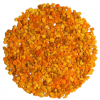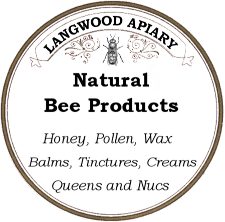
The high nutritional value, unique biochemical and mineral composition of pollen, protein saturation, essential amino acids, microelements and other biologically active substances give grounds to attribute pollen to be an extremely valuable food additive with wide ranges of indications for use. Even though qualities of bee pollen (in any form) significantly exceed qualities of honey, it did not receive wide use because it does not have such attractive taste as honey.
Pollen can be used in the form of pure pollen, collected from plants by humans, in the form of pollen nuggets or in the form of “bee bread”. Like honey, pollen in any form can be recommended as:
- an independent therapeutic agent;
- in combination with other bee products;
- in combination with medical treatment;
- in combination with phytotherapy and physiotherapy;
Like honey, pollen cannot be used as the only independent means for acute chronic diseases and severe types of pathology. In these cases, it is used only as an adjunct to the main treatment. A patient taking pollen should be aware that the clinical effect from it develops gradually, slowly and the best results can be obtained by combining pollen with other beekeeping products, especially honey and royal jelly.
As a prophylactic, pollen can be recommended for patients:
- under stressful situations, with considerable physical and mental loads (hard work, sports, high mental loads);
- women during pregnancy;
- during the outbreaks of SARS (Severe Acute Respiratory Syndrome) and flu in order to increase resistance to infections;
- of older age groups in the presence of pronounced reaction to changes in weather;
- as a broad specter gerontological agent helping to maintain health and youth;
- with frequent illnesses, often with signs of immunodeficiency;
- after infectious diseases, surgical interventions and during the chemotherapy for a quick recuperation;
- before and after a surgery as a general tonic;
- with chronic fatigue syndrome;
For medicinal purposes, pollen is used in therapy of many diseases. It can be very useful in chronic pulmonary pathology – chronic bronchitis, bronchiectasis, pulmonary tuberculosis. In neurology, pollen is considered as a mild psychotropic agent; it creates the effect of tranquilizers but does not have side effects. Pollen is recommended in asthenic conditions, neuroses, and menopause.
Clinically, pollen is similar to broad spectrum antidepressants. It is recommended when coming out of depression caused by stress, alcohol intoxication, long-term illness and it also heals withdrawal symptoms.
Pollen is considered as a universal remedy for many cardiovascular diseases. It contains a lot of potassium, magnesium and is therefore especially indicated for older and elderly people. It helps to improve metabolic processes in the myocardium, increasing its contractility and tolerance of physical activity. Prolonged intake of pollen leads to the normalization of lipid metabolism and the prevention of the formation of atheromatous plaques. A positive result is observed in the treatment of patients with the initial stage of hypertension, pollen acts gently (symptoms of headaches, dizziness disappear). When pollen is given to patients with any type of cardio psychoneurosis, their blood pressure quickly returns to normal and the pain in the heart disappears.
Pollen greatly improves reparative processes: it is prescribed for gastric ulcer, duodenal ulcer and erosion of the gastrointestinal tract. A positive effect is observed in the treatment of chronic gastritis, as well as chronic enteritis and colitis. Pollen normalizes bowel function, eliminating constipation and diarrhea. Positive results are achieved in the treatment of chronic hepatitis, which contributes to the special amino acid composition of pollen. After a sufficient course of treatment, the function of the liver cells is restored and liver function tests return to normal. A good effect is noted from the use of pollen in post cholecystectomy syndrome – the pain quickly disappears and the drainage function of the biliary tract improves.
Positive results are observed in the treatment with pollen urolithiasis, chronic pyelonephritis, prostatitis, prostate adenoma, impotence.
Pollen contains a significant amount of iron and other trace elements, so it is successfully used in the treatment of mild forms of anemia in children and adults, it is prescribed for reduced nutrition, as well as convalescents after severe illness. Extremely useful for people with folic (B12) deficiency states of any origin and iodine deficiency diseases of the thyroid gland. In regions disadvantaged by endemic goiter, it is used as a prophylactic agent.
In surgical practice, pollen is recommended before and after surgery. Features of protein and amino acid composition, abundance of trace elements contribute to the rapid recovery of the patient. The presence of bio stimulants in pollen improves regenerative processes, reduces the inflammatory response after surgery. For the same reasons, pollen is indicated for the treatment of external ulcers, especially ulcers of the extremities. In such situations, it is recommended to combine pollen with taking royal jelly.
In recent years, pollen has been recommended in the treatment of obesity (fasting is combined with pollen intake) because its amino acid composition prevents breakdown of proteins and patient’s weight decreases mainly due to fat burning.
In oncology, pollen is used as a tonic agent during chemotherapy, facilitating its tolerability. A positive result was noted from intake of pollen in combination with propolis for AIDS patients. Their well-being is improving and life is prolonged.
